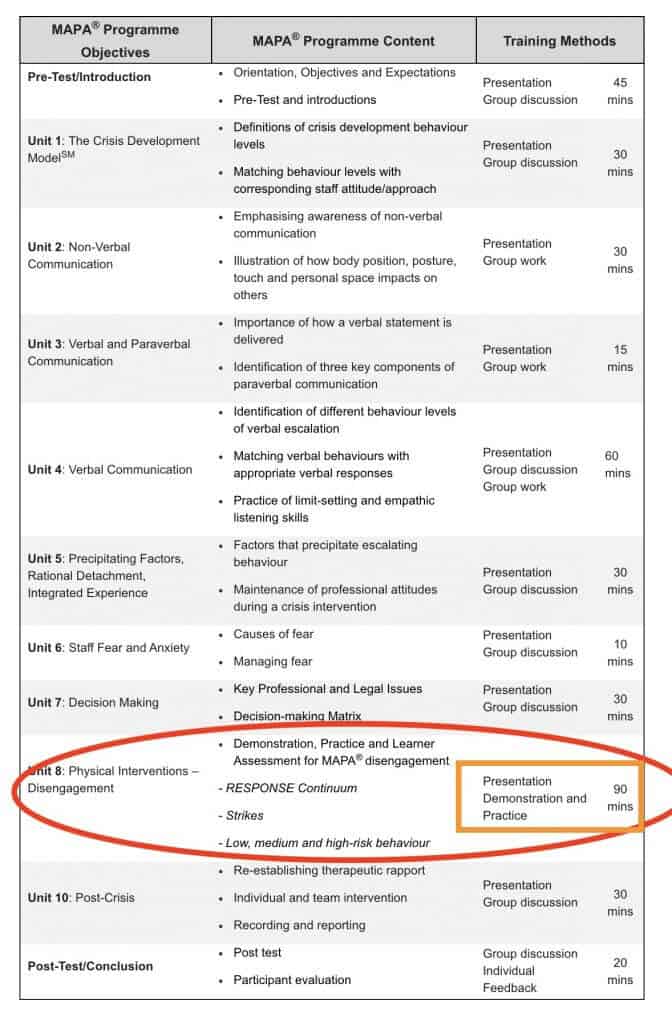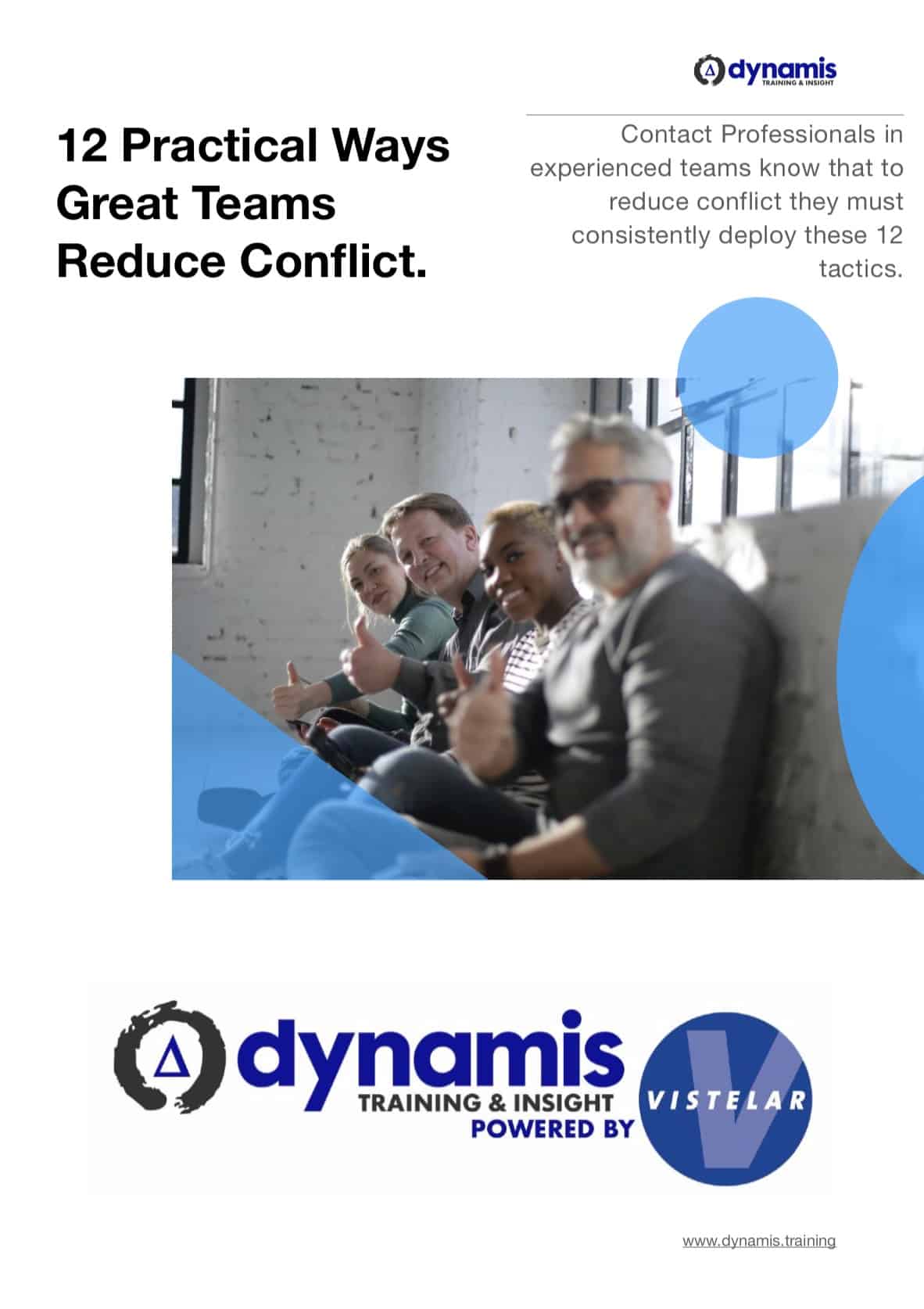A Breakaway training day from Dynamis is designed to enable Public-Facing staff faced with the imminent threat of violence or a violent assault with the appropriate attitudes and tactics for personal safety. If danger can not be avoided any other way, staff should breakaway or disengage from violence and move towards safety using appropriate personal safety or self-defence skills. However if you look at the above you might notice that the schedule of training for the breakaway training provided for some staff by other providers only has 90 minutes of practice time allocated in a whole day of breakaway training!

In an Evidence-based world, how can this be?
We know from research after research after research, some conducted well over a decade ago that breakaway training requires a fresh approach, which recognises that time on task is an important component of the success of transferring skills to the cares, nurses, doctors and whomever we are teaching who needs to learn the skills. In 2019 and in our world which is increasingly focussed on evidence-based practice, how can it be that we still have a training programme focussed on giving staff physical skills which seems to allocate such little time to practice?
Here’s a video about how important time is in training in general, and not just on a Breakaway Training Day:
“Time on Task is a Proxy for Learning”
I once asked Prof. Chris Cushion about one of the most powerful analyses he does when he does Coach Development – a time-on-task analysis. He told me that every coach who is trying to ensure learning in his class needs one piece of kit:
“The number one piece of kit that’s really inexpensive, I would say would be a stopwatch because the time on task is a proxy for learning and you need to be in control of time for a whole range of reasons. To maximize time on task, to limit the war stories, to manage transitions and breaks. If people are on training courses to learn to do something, it makes sense that they spend the most time learning to do something, not listening to somebody else talk about it or stand with their mates having a coffee or meandering from thing to thing. And the way that you control that is by timing it, so I’m gonna work for five minutes, I’m gonna time it for five minutes, we’re gonna have a five minute whatever it is, and have it on a stopwatch so you know, because time slips away.” – Prof. Chris Cushion
Furthermore, when we saw this, we wondered how come the verbal skills were separated out from the physical skills, and given NO practice time on the Breakaway Training Day?
Here is a video about how important ‘meshing’ is in training:
Meshing the Verbal Skills with your Breakaway Techniques
Let me ask veteran trainer Gary Klugiewicz from Vistelar to give you his view of this:
“A lot of people say talk nice to people who aren’t talking nice to you. That works until the first person gets in your face and starts calling you a lot of names and you get really angry and you get very upset. Well, what we have to do is not do fire talks, (lectures about “talking nice to people”), but we need to do fire drills where we actually practice doing it and we actually set up and we train scripts. So how do you make a good initial contact? How do you deal with verbal abuse? You know, how do you listen well and ask questions, get more information to become truly empathetic? How do you paraphrase? How do you persuade someone who doesn’t want to do what you want to doing? How do you bring someone down at the end? You don’t get performance when you give a talk saying “talk nice to people”. That’s rather a series of drill and exercises with specific outcomes in mind in terms of the person’s performance of their conflict management skills
Here’s some reasons why practice should be the focus of your training in all domains (not just on a Breakaway Training Day):
Practice is important for teaching and learning in at least five ways:
- Practice greatly increases the likelihood that students will permanently remember new information (Anderson, 2008).
- Practice increases student facility or automaticity (learning to apply elements of knowledge automatically, without reflection). Automaticity is usually only achieved through extensive rehearsal and repetition. Automaticity frees up students cognitive resources to handle more challenging tasks (Brown & Bennett, 2002; Moors & De Houwer, 2006).
- When students practice solving problems, they increase their ability to transfer practiced skills to new and more complex problems. This is true in childhood (Glover, Ronning, & Bruning, 1990) and adult years (Li, Schmiedek, Huxhold, Röcke, Smith, & Lindenberger, 2008).
- Practice helps students acquire expertise in subject matter and, therefore, it helps to distinguish novices from experts in given subjects (Ericsson, Krampe, & Clemens, 1993)
- Cognitive gains from practice often bring about motivation for more learning (Kalchman, Moss, & Case, 2001).
To learn more about how to maximise training effectiveness, as a CPD activity for trainers who teach conflict management, physical interventions, officer safety or PMVA, please visit: www.dynamis.training/scena
To learn about our Breakaway Training, please go to: www.dynamis.training/breakaway


